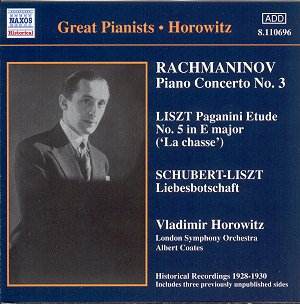This is another valuable release from Naxos Historical
as it restores to the catalogue the earliest of Horowitz’s three commercial
recordings of Rachmaninov 3. It also gives us three previously unreleased
solo items as part of a fascinating recital, recorded when the maestro
was in his twenties and just beginning to establish a serious reputation.
Horowitz’s later (1951) version of this much-recorded
concerto is generally regarded as his finest, with the pianist still
on top form and with superb support from Reiner and the RCA Orchestra.
Still, this 1930 recording, one of the very earliest the work received
is well worth hearing. It suffers from understandably primitive sound,
with quite a bit of orchestral detail muffled or hidden, and balance
between piano and orchestra occasionally unfocused. Naxos’ resident
magician, Mark Obert-Thorn has done an excellent remastering job to
make it into the very creditable end result we have here, and despite
flaws it is easily possible to judge the performance objectively. What
we get, as one would probably expect from the young firebrand, is pianistic
dynamism of the highest order. The Russian-born Albert Coates is in
overall charge, but many times one gets the impression that Horowitz
is leading the way. The opening pulse is pretty fast, and it soon becomes
apparent that the pianist is revelling in being able to cram all the
detail in despite the fast speed. As mentioned, a fair bit of Rachmaninov’s
soloistic orchestral detail is rather muddy, a good example being the
lovely bassoon passage at 3’55. Tuttis are generally quite well handled,
though at 6’43 we hear one of many places where the soloist is racing
ahead of his partners. It all makes for a tremendously exciting experience,
where even uncertainty of ensemble simply adds to the impression of
a live experience. Horowitz opts for the ‘easier’ (or perhaps one should
say less ostentatious) cadenza, actually the more musically satisfying.
The slow movement is well done, and the finale kicks off at a blistering
tempo. It’s a pity we get the two traditional but disfiguring cuts,
and there is a memory lapse from the pianist at 7’05 (nothing serious,
just piano and orchestra parting company for a few seconds before getting
back on track). The clarinet delay is almost understandable at 7’53,
given the soloist’s impetuosity, but the sum total is a marvellous historic
document, full of personality, temperament and flair.
All but three of the solo items have appeared on discs
before, but are all worth having again. The three 78 sides now included
are the Schubert-Liszt Liebesbotschaft, the Liszt-Paganini Etude
No.5 and the Chopin F major Etude. All are despatched with
phenomenal accuracy and volatility, though the rather tinny sound of
the piano does not help (it sounds in dire need of a tuner at the top
end). All the remaining items are enjoyable. I particularly enjoyed
the Dohnányi Capriccio, famous for its hair-raising difficulties
and something of a calling card for Horowitz, who revels in the technical
hurdles. I love his rhythmic snap in the Chopin Mazurka as well
as its touching close. The Debussy has plenty of pedal but is superbly
controlled. Scarlatti was always a favourite of Horowitz, and in this
E major Capriccio we hear his customary dexterity, with the closing
runs in thirds delivered with fabulous panache and glitter.
It goes without saying that this will be a must for
dedicated pianophiles. Warts and all, it’s difficult to imagine a more
viscerally exciting rendition of the concerto, and the solo items, the
very first things he did in the studio, offer a real insight into why
he became the legend he did. This sort of outsize personality does not
come along very often. Snap it up and enjoy.
Tony Haywood

